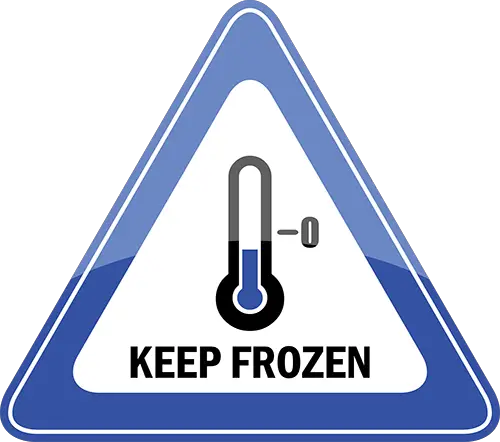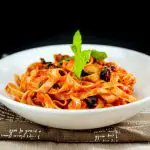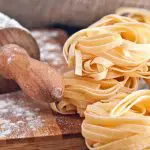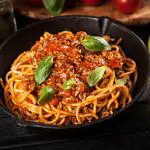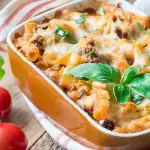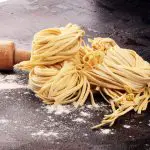Can You Freeze Cooked Pasta? (Yes! 2 Easy Ways)
Meal preparation is difficult; people are busy, overwhelmed, or have trouble with it for one reason or another. Making meals ahead of time and freezing them can help but unfortunately, some meals don’t freeze well and come out dry or soggy. So, you may be wondering, can you freeze pasta?
You can freeze pasta if you avoid air contact during the freezing process, leave out sauce and cheese, and let your pasta cool first. You can freeze your pasta in individual portions or flash-freeze it with oil to keep the pasta from sticking. It makes an easy meal that’s quick and tasty.
In this article, I’ll explain what you need to freeze pasta with two different methods and go over what you should avoid doing with frozen pasta to avoid the pitfalls of freezing this delicious dish. If this sounds great, then go ahead and read more.
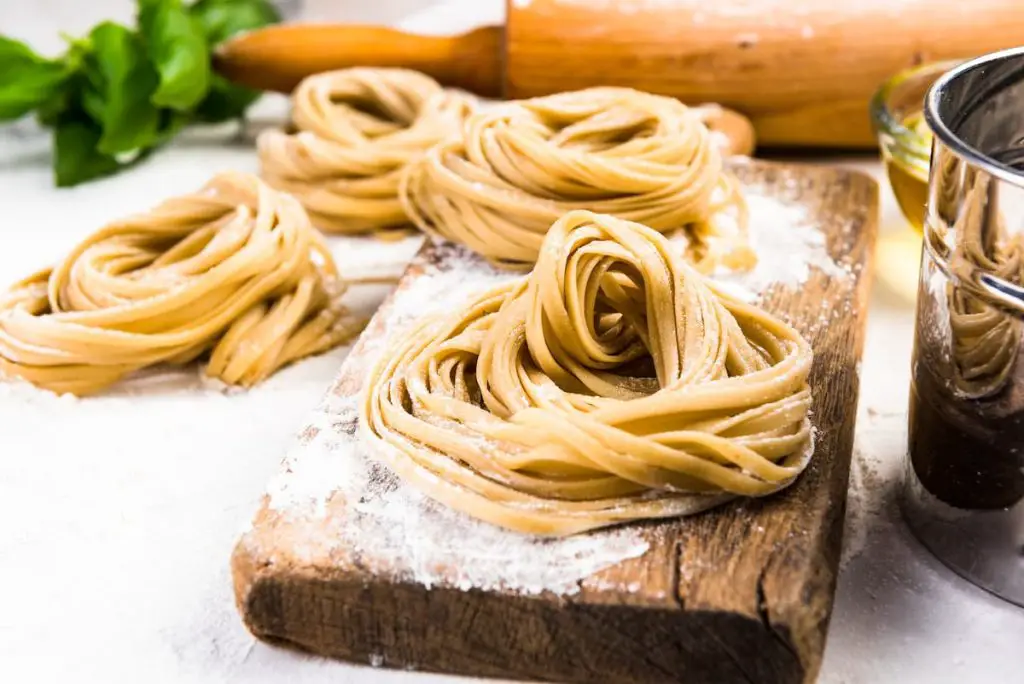
Yes, You Can Freeze Pasta
Pasta is deliciously high in carbs, can be whipped up with tasty sauces, and thus is many people’s favorite addiction. However, freezing it doesn’t immediately spring to mind. Why?
Pasta is porous and is commonly served with cheese and sauces. Cheese spoils quickly after melting, and pasta can pick up freezer smells and even freezer burn. Due to freezing, its texture might change from delightfully chewy to dry and crunchy or soggy and mushy.
Thankfully, if you prepare beforehand in the ways I’ll outline in this article, you can create an almost ready-made freezer meal you can heat up on the stove or in the microwave without the potential pitfalls. All it takes is some thinking ahead.
How You Can Freeze Pasta
So, how exactly do you freeze pasta?
First, you’ll need some plain pasta cooked al-dente—or until it’s still slightly chewy—and some materials to use during the freezing process. With either of the two methods, you’ll need Ziplock-style reusable bags. The rest depends on which method you’re using.
If you want to freeze your pasta in individual portions, you’ll need a baking sheet and parchment paper—a waxy, heat-proof paper used by cooks. You can find it at any grocery store.
However, if you want to flash-freeze your pasta with oil, all you need is plastic bags and some olive oil. While you can use canola and other types of oil, olive oil is most commonly used for pasta.
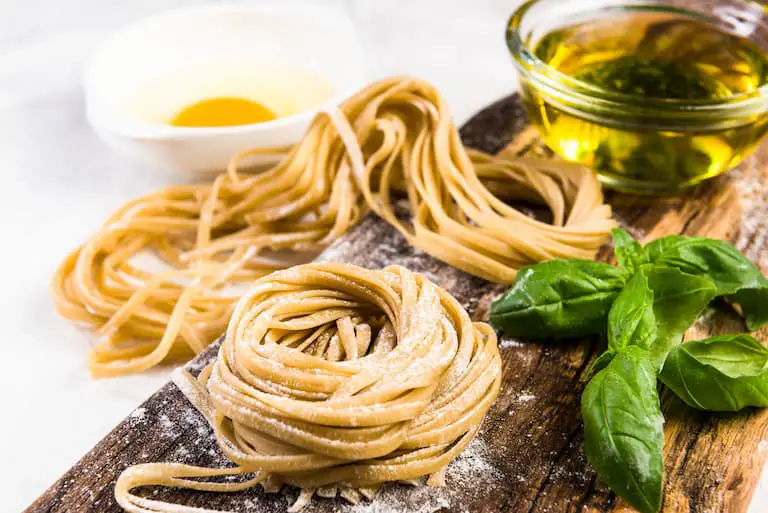
Freezing Your Pasta in Individual Portions
To freeze your pasta in individual portions, you’ll want to have cooked and strained your al-dente pasta first. Once you’ve done so, you can follow these steps.
- First, put parchment paper on a baking sheet. Then divide your cooked pasta into individual-sized “lumps.”
- Place your pasta lumps on the parchment paper, spacing them evenly. Let your pasta cool until it’s no longer warm to the touch.
- Place your baking sheet in the freezer for 30 minutes to an hour. You want your pasta lumps to be frozen enough they don’t fall apart.
- Remove your baking sheet and pasta from the freezer. Pack your frozen pasta into resealable Ziplock-style bags.
- Press out all the air in the bag to prevent freezer burn. Put your bagged pasta back in your freezer for later.
Remember—frozen pasta has a three-month shelf-life. So you should label your bag to ensure you don’t eat spoiled food.
Freezing Your Pasta In Bulk With Oil
To flash-freeze your pasta with oil to keep it from sticking, you’ll want to have cooked and strained your al-dente pasta first, like with the individual portions method. Once you have, you can follow these steps.
- After straining your pasta, toss it in olive oil until it is completely covered.
- Let your pasta cool until it’s no longer warm to the touch.
- Pack your frozen pasta into resealable Ziplock-style bags.
- Press out all the air in the bag to prevent freezer burn.
- Put your bagged pasta in your freezer for later.
Like before, your pasta has a three-month shelf-life. So if you don’t think you’ll eat it all before then, label your bag to keep from eating spoiled food.
Can You Freeze Your Pasta With Sauce?
It’s not advised to freeze your pasta with sauce. It can change the texture of the pasta, causing it to become mushy or fall apart. The sauce is also more susceptible to freezer burn than the pasta.
When moisture freezes, it forms crystals and expands. When this happens, it damages the substance’s structure. It’s the same with pasta sauce as it contains moisture; freezing your pasta with sauce can cause the pasta to fall apart and become soggy mush.
Meanwhile, additional moisture content means more of a chance for frost to accumulate on your food’s surface from contact with air. This sucks the moisture from it too quickly, causing freezer burn and destroying your pasta’s taste and texture.
So, if you want sauce with your frozen pasta, ideally you’ll want to freeze it in a separate container.
What You Should Avoid When Freezing Pasta
No sauces, then. So what else should you avoid when freezing pasta?
You shouldn’t freeze pasta with cheese on it and should avoid air contact during the freezing process. Let your pasta cool before freezing, too.
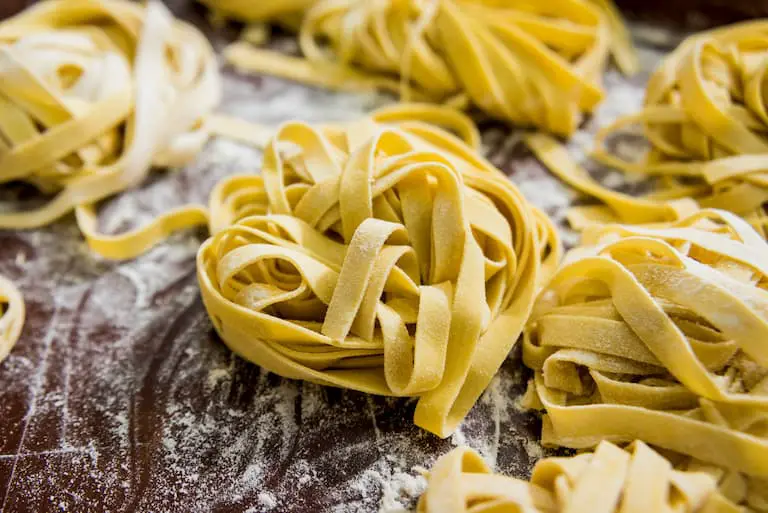
Don’t Freeze Pasta With Cheese
Cheese is only good for a little while after it melts. After that, it hardens up, produces oils, and spoils very quickly. It also can’t be returned to its pre-melted state.
So, it’s not good to freeze melted cheese atop your pasta. It will affect the quality of your meal. If you want cheese on your frozen pasta, put it on after thawing and reheating it.
Avoid Air Contact While Freezing
If you’ve ever eaten something freezer burnt, you know what it does to food. The taste and texture are dry and musty. If you haven’t tried it already, it’s safe to say you don’t want to.
However, there’s good news. For freezer burn to happen, your pasta needs contact with the air during the freezing process. This makes it entirely preventable.
So, before putting your pasta in the freezer, squeeze all air out of the bag. Your future self will thank you for your attention to detail.
Let Your Pasta Cool First
Food that’s put in the freezer warm tends to turn out soggy. This is because mixing temperatures causes condensation, and any moisture in your bag will collect on and in your food. Yuck.
Always let your pasta cool until it’s no longer warm to the touch before you put it in the freezer.
Can You Freeze Cooked Pasta – Summary
Yes, you can freeze pasta. You can freeze it on a baking sheet in individual portions or freeze it in bulk with oil. However, you shouldn’t freeze it with sauce.
You also shouldn’t freeze your pasta with cheese, should avoid air contact while freezing, and let your pasta cool completely before freezing.
